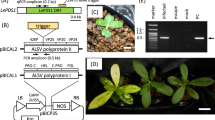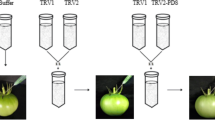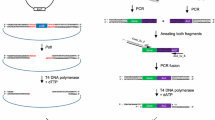Abstract
Main conclusion
The use of a VIGS approach to silence the newly characterized apple tree SQS isoforms points out the biological function of phytosterols in plastid pigmentation and leaf development.
Triterpenoids are beneficial health compounds highly accumulated in apple; however, their metabolic regulation is poorly understood. Squalene synthase (SQS) is a key branch point enzyme involved in both phytosterol and triterpene biosynthesis. In this study, two SQS isoforms were identified in apple tree genome. Both isoforms are located at the endoplasmic reticulum surface and were demonstrated to be functional SQS enzymes using an in vitro activity assay. MdSQS1 and MdSQS2 display specificities in their expression profiles with respect to plant organs and environmental constraints. This indicates a possible preferential involvement of each isoform in phytosterol and/or triterpene metabolic pathways as further argued using RNAseq meta-transcriptomic analyses. Finally, a virus-induced gene silencing (VIGS) approach was used to silence MdSQS1 and MdSQS2. The concomitant down-regulation of both MdSQS isoforms strongly affected phytosterol synthesis without alteration in triterpene accumulation, since triterpene-specific oxidosqualene synthases were found to be up-regulated to compensate metabolic flux reduction. Phytosterol deficiencies in silenced plants clearly disturbed chloroplast pigmentation and led to abnormal development impacting leaf division rather than elongation or differentiation. In conclusion, beyond the characterization of two SQS isoforms in apple tree, this work brings clues for a specific involvement of each isoform in phytosterol and triterpene pathways and emphasizes the biological function of phytosterols in development and chloroplast integrity. Our report also opens the door to metabolism studies in Malus domestica using the apple latent spherical virus-based VIGS method.










Similar content being viewed by others
Abbreviations
- ALSV:
-
Apple latent spherical virus
- CAS:
-
Cycloartenol synthase
- SQS:
-
Squalene synthase
- FPP:
-
Farnesyl diphosphate
- OSC:
-
Oxidosqualene cyclase
- VIGS:
-
Virus-induced gene silencing
References
Adams RP (2007) Identification of essential oil components by gas chromatography/mass spectrometry. Allured Publishing Corporation, Carol Stream
Andre C, Legay S, Deleruelle A, Nieuwenhuizen N, Punter M, Brendolise C, Cooney JM, Lateur M, Hausman JF, Larondelle Y, Laing W (2016) Multifunctional oxidosqualene cyclases and cytochrome P450 involved in the biosynthesis of apple fruit triterpenic acids. New Phytol 211:1279–1294. doi:10.1111/nph.13996
Babiychuk E, Bouvier-Navé P, Compagnon V, Suzuki M, Muranaka T, Van Montagu M, Kushnir S, Schaller H (2008) Allelic mutant series reveal distinct functions for Arabidopsis cycloartenol synthase 1 in cell viability and plastid biogenesis. Proc Natl Acad Sci USA 105:3163–3168. doi:10.1073/pnas.0712190105
Baker CH, Matsuda SP, Liu DR, Corey EJ (1995) Molecular cloning of the human gene encoding lanosterol synthase from a liver cDNA library. Biochem Biophys Res Commun 213:154–160. doi:10.1006/bbrc.1995.2110
Becker DM, Guarente L (1991) High-efficiency transformation of yeast by electroporation. Methods Enzymol 194:182–187. doi:10.1016/0076-6879(91)94015-5
Benveniste P (2002) Sterol metabolism. Arabidopsis Book 1:e0004. doi:10.1199/tab.0004
Brendolise C, Yauk YK, Eberhard ED, Wang M, Chagne D, Andre C, Greenwood D, Beuning LL (2011) An unusual plant triterpene synthase with predominant α-amyrin- producing activity identified by characterizing oxidosqualene cyclases from Malus × domestica. FEBS J 278:2485–2499. doi:10.1111/j.1742-4658.2011.08175.x
Bringe K, Schumacher CF, Schmitz-Eiberger M, Steiner U, Oerke E (2006) Ontogenetic variation in chemical and physical characteristics of adaxial apple leaf surfaces. Phytochemistry 67:161–170. doi:10.1016/j.phytochem.2005.10.018
Busquets A, Keim V, Closa M, Del Arco A, Boronat A, Arró M, Ferrer A (2008) Arabidopsis thaliana contains a single gene encoding squalene synthase. Plant Mol Biol 67:25–36. doi:10.1007/s11103-008-9299-3
Clouse SD (2002) Arabidopsis mutants reveal multiple roles for sterols in plant development. Plant Cell 14:1995–2000. doi:10.1105/tpc.140930
Corey EJ, Matsuda SPT, Bartel B (1993) Isolation of an Arabidopsis thaliana gene encoding cycloartenol synthase by functional expression in a yeast mutant lacking lanosterol synthase by the use of a chromatographic screen. Proc Natl Acad Sci USA 90:11628–11632
D’Abrosca B, Fiorentino A, Monaco P, Pacifico S (2005) Radical-scavenging activities of new hydroxylated ursane triterpenes from cv. Annurca apples. Chem Biodivers 2:953–958. doi:10.1002/cbdv.200590072
Devarenne TP, Shin DH, Back K, Yin S, Chappell J (1998) Molecular characterization of tobacco squalene synthase and regulation in response to fungal elicitor. Arch Biochem Biophys 349:205–215. doi:10.1006/abbi.1997.0463
Dugé de Bernonville T, Guyot S, Paulin JP, Gaucher M, Loufrani L, Henrion D, Derbré S, Guilet D, Richomme P, Dat JF, Brisset MN (2010) Dihydrochalcones: implication in resistance to oxidative stress and bioactivities against advanced glycation end-products and vasoconstriction. Phytochemistry 71:443–452. doi:10.1016/j.phytochem.2009.11.004
Eberhardt MV, Lee CY, Liu RH (2000) Antioxidant activity of fresh apples. Nature 405:903–904. doi:10.1038/35016148
Elejalde-Palmett C, Dugé de Bernonville T, Glévarec G, Pichon O, Papon N, Courdavault V, St-Pierre B, Giglioli-Guivarc’H N, Lanoue A, Besseau S (2015) Characterization of a spermidine hydroxycinnamoyltransferase in Malus domestica highlights the evolutionary conservation of trihydroxycinnamoyl spermidines in pollen coat of core Eudicotyledons. J Exp Bot 66:7271–7285. doi:10.1093/jxb/erv423
Gas-Pascual E, Berna A, Bach TJ, Schaller H (2014) Plant oxidosqualene metabolism: cycloartenol synthase–dependent sterol biosynthesis in Nicotiana benthamiana. PLoS One 9:e109156. doi:10.1371/journal.pone.0109156
González-Coloma A, López-Balboa C, Santana O, Reina M, Fraga BM (2011) Triterpene-based plant defenses. Phytochem Rev 10:245–260. doi:10.1007/s11101-010-9187-8
Goodstein DM, Shu S, Howson R, Neupane R, Hayes RD, Fazo J, Mitros T, Dirks W, Hellsten U, Putnam N, Rokhsar DS (2012) Phytozome: a comparative platform for green plant genomics. Nucleic Acids Res 40:1178–1186. doi:10.1093/nar/gkr944
Gu P, Ishii Y, Spencer TA, Shechter I (1998) Function-structure studies and identification of three enzyme domains involved in the catalytic activity in rat hepatic squalene synthase. J Biol Chem 273:12515–12525. doi:10.1074/jbc.273.20.12515
Guirimand G, Burlat V, Oudin A, Lanoue A, St-Pierre B, Courdavault V (2009) Optimization of the transient transformation of Catharanthus roseus cells by particle bombardment and its application to the subcellular localization of hydroxymethylbutenyl 4-diphosphate synthase and geraniol 10-hydroxylase. Plant Cell Rep 28:1215–1234. doi:10.1007/s00299-009-0722-2
Hartmann M-A (1998) Plant sterols and the membrane environment. Trends Plant Sci 3:170–175. doi:10.1016/S1360-1385(98)01233-3
Hata S, Sanmiya K, Kouchi H, Matsuoka M, Yamamoto N, Izui K (1997) cDNA cloning of squalene synthase genes from mono- and dicotyledonous plants and expression of the gene in rice. Plant Cell Physiol 38:1409–1413. doi:10.1093/oxfordjournals.pcp.a029137
Haudenschild C, Hartmann M-A (1995) Accumulation of furanocoumarins in parsley cell suspension cultures. Phytochemistry 40:1117–1124. doi:10.1016/0031-9422(95)00434-9
Hayashi H, Hirota A, Hiraoka N, Ikeshiro Y (1999) Molecular cloning and characterization of two cDNAs for Glycyrrhiza glabra squalene synthase. Biol Pharm Bull 22:947–950
He X, Rui HL (2007) Triterpenoids isolated from apple peels have potent antiproliferative activity and may be partially responsible for apple’s anticancer activity. J Agric Food Chem 55:4366–4370. doi:10.1021/jf063563o
Herrera JBR, Bartel B, Wilson WK, Matsuda SP (1998) Cloning and characterization of the Arabidopsis thaliana lupeol synthase gene. Phytochemistry 49:1905–1911. doi:10.1016/S0031-9422(98)00366-5
Ho SN, Hunt HD, Horton RM, Pullen JK, Pease LR (1989) Site-directed mutagenesis by overlap extension using the polymerase chain reaction. Gene 77:51–59. doi:10.1016/0378-1119(89)90358-2
Hu Y, Bao F, Li J (2000) Promotive effect of brassinosteroids on cell division involves a distinct CycD3-induction pathway in Arabidopsis. Plant J 24:693–701. doi:10.1046/j.1365-313X.2000.00915.x
Huang Z, Jiang K, Pi Y, Hou R, Liao Z, Cao Y, Han X, Wang Q, Sun X, Tang K (2007) Molecular cloning and characterization of the yew gene encoding squalene synthase from Taxus cuspidata. J Biochem Mol Biol 40:625–635
Jäger S, Trojan H, Kopp T, Laszczyk MN, Scheffler A (2009) Pentacyclic triterpene distribution in various plants—rich sources for a new group of multi-potent plant extracts. Molecules 14:2016–2031. doi:10.3390/molecules14062016
Jennings SM, Tsay YH, Fisch TM, Robinson GW (1991) Molecular cloning and characterization of the yeast gene for squalene synthetase. Proc Natl Acad Sci USA 88:6038–6042
Kim HB, Lee H, Oh CJ, Lee HY, Eum HL, Kim HS, Hong YP, Lee Y, Choe S, An C, Choi SB (2010) Postembryonic seedling lethality in the sterol-deficient Arabidopsis cyp51A2 mutant is partially mediated by the composite action of ethylene and reactive oxygen species. Plant Physiol 152:192–205. doi:10.1104/pp.109.149088
Kim T-D, Han J-Y, Huh GH, Choi Y-E (2011) Expression and functional characterization of three squalene synthase genes associated with saponin biosynthesis in Panax ginseng. Plant Cell Physiol 52:125–137. doi:10.1093/pcp/pcq179
Kolesnikova MD, Xiong Q, Lodeiro S, Hua L, Matsuda SPT (2006) Lanosterol biosynthesis in plants. Arch Biochem Biophys 447:87–95. doi:10.1016/j.abb.2005.12.010
Kribii R, Arró M, Del Arco A, González V, Balcells L, Delourme D, Ferrer A, Karst F, Boronat A (1997) Cloning and characterization of the Arabidopsis thaliana SQS1 gene encoding squalene synthase—involvement of the C-terminal region of the enzyme in the channeling of squalene through the sterol pathway. Eur J Biochem 249:61–69. doi:10.1111/j.1432-1033.1997.00061.x
Kushiro T, Shibuya M, Ebizuka Y (1998) Cloning of oxidosqualene cyclase that catalyzes the formation of the most popular triterpene among higher plants. Eur J Biochem 256:238–244
Lee MH, Jeong JH, Seo JW, Shin CG, Kim YS, In JG, Yang DC, Yi JS, Choi YE (2004) Enhanced triterpene and phytosterol biosynthesis in Panax ginseng overexpressing squalene synthase gene. Plant Cell Physiol 45:976–984. doi:10.1093/pcp/pch126
Lindsey K, Pullen ML, Topping JF (2003) Importance of plant sterols in pattern formation and hormone signalling. Trends Plant Sci 8:521–525. doi:10.1016/j.tplants.2003.09.012
Ma CM, Cai SQ, Cui JR, Wang RQ, Tu PF, Hattori M, Daneshtalab M (2005) The cytotoxic activity of ursolic acid derivatives. Eur J Med Chem 40:582–589. doi:10.1016/j.ejmech.2005.01.001
Manavalan LP, Chen X, Clarke J, Salmeron J, Nguyen HT (2012) RNAi-mediated disruption of squalene synthase improves drought tolerance and yield in rice. J Exp Bot 63:163–175. doi:10.1093/jxb/err258
Mckenzie TL, Jiang G, Straubhaar JR, Conrad DG, Shechters I (1992) Molecular cloning, expression, and characterization of the cDNA for the rat hepatic squalene synthase. J Biol Chem 267:21368–21374
Miyazawa Y, Nakajima N, Abe T, Sakai A, Fujioka S, Kawano S, Kuroiwa T, Yoshida S (2003) Activation of cell proliferation by brassinolide application in tobacco BY-2 cells: effects of brassinolide on cell multiplication, cell-cycle-related gene expression, and organellar DNA contents. J Exp Bot 54:2669–2678. doi:10.1093/jxb/erg312
Müssig C (2005) Brassinosteroid-promoted growth. Plant Biol 7:110–117. doi:10.1055/s-2005-837493
Mutwil M, Klie S, Tohge T, Giorgi FM, Wilkins O, Campbell MM, Fernie AR, Usadel B, Nikoloski Z, Persson S (2011) PlaNet: combined sequence and expression comparisons across plant networks derived from seven species. Plant Cell 23:895–910. doi:10.1105/tpc.111.083667
Nelson BK, Cai X, Nebenführ A (2007) A multicolored set of in vivo organelle markers for co-localization studies in Arabidopsis and other plants. Plant J 51:1126–1136. doi:10.1111/j.1365-313X.2007.03212.x
Nieuwenhuizen NJ, Green SA, Chen X, Bailleul EJD, Matich AJ, Wang MY, Atkinson RG (2013) Functional genomics reveals that a compact terpene synthase gene family can account for terpene volatile production in apple. Plant Physiol 161:787–804. doi:10.1104/pp.112.208249
Novotny C, Karst F (1994) Sterol dependent growth and ethanol tolerance of a sterol-auxotrophic erg9:HIS3 mutant of Saccharomyces cerevisiae. Biotechnol Lett 16:539–542. doi:10.1007/BF01023340
Pandit J, Danley DE, Schulte GK, Mazzalupo S, Pauly T, Hayward CM, Hamanaka ES, Thompson JF, Harwood HJ (2000) Crystal structure of human squalene synthase. Biochemistry 275:30610–30617. doi:10.1074/jbc.M004132200
Patro R, Duggal G, Love MI, Irizarry RA, Kingsford C (2016) Salmon provides accurate, fast, and bias-aware transcript expression estimates using dual-phase inference. Preprint BioarXiv. doi:10.1101/021592
Pechous SW, Whitaker BD (2004) Cloning and functional expression of an (E, E)-farnesene synthase cDNA from peel tissue of apple fruit. Planta 219:84–94. doi:10.1007/s00425-003-1191-4
Phillips DR, Rasbery JM, Bartel B, Matsuda SP (2006) Biosynthetic diversity in plant triterpene cyclization. Curr Opin Plant Biol 9:305–314. doi:10.1016/j.pbi.2006.03.004
Racovita RC, Jetter R (2016) Composition of the epicuticular waxes coating the adaxial side of Phyllostachys aurea leaves: identification of very-long-chain primary amides. Phytochemistry 130:1–10. doi:10.1016/j.phytochem.2016.06.005
Robinson GW, Tsay YIMH, Kienzle BK, Smith-monroy CA, Bishop RW (1993) Conservation between human and fungal squalene synthetases: similarities in structure, function, and regulation. Mol Cell Biol 13:2706–2717. doi:10.1128/MCB.13.5.2706
Sasaki S, Yamagishi N, Yoshikawa N (2011) Efficient virus-induced gene silencing in apple, pear and japanese pear using Apple latent spherical virus vectors. Plant Methods 7:15–25. doi:10.1186/1746-4811-7-15
Schaller H (2003) The role of sterols in plant growth and development. Prog Lipid Res 42:163–175. doi:10.1016/S0163-7827(02)00047-4
Schaller H (2004) New aspects of sterol biosynthesis in growth and development of higher plants. Plant Physiol Biochem 42:465–476. doi:10.1016/j.plaphy.2004.05.012
Seo JW, Jeong JH, Shin CG, Lo SC, Han SS, Yu KW, Harada E, Han JY, Choi YE (2005) Overexpression of squalene synthase in Eleutherococcus senticosus increases phytosterol and triterpene accumulation. Phytochemistry 66:869–877. doi:10.1016/j.phytochem.2005.02.016
Shi Z, Buntel CJ, Griffin JH (1994) isolation and characterization of the gene encoding 2,3-oxidosqualene- lanosterol cyclase from Saccharomyces cerevisiae. Proc Natl Acad Sci USA 91:7370–7374
Singh AK, Dwivedi V, Rai A, Pal S, Reddy SGE, Rao DKV, Shasany AK, Nagegowda D (2015) Virus-induced gene silencing of Withania somnifera squalene synthase negatively regulates sterol and defence-related genes resulting in reduced withanolides and biotic stress tolerance. Plant Biotechnol J 13:1287–1299. doi:10.1111/pbi.12347
Sonawane PD, Pollier J, Panda S, Szymanski J, Massalha H, Yona M et al (2016) Plant cholesterol biosynthetic pathway overlaps with phytosterol metabolism. Nat Plants 3:16205–16218. doi:10.1038/nplants.2016.205
Summers C, Karst F, Charles AD (1993) Cloning, expression and characterisation of the cDNA encoding human hepatic squalene synthase, and its relationship to phytoene synthase. Gene 136:185–192. doi:10.1016/0378-1119(93)90462-C
Suzuki H, Achnine L, Xu R, Matsuda SPT, Dixon R (2002) A genomics approach to the early stages of triterpene saponin biosynthesis in Medicago truncatula. Plant J 32:1033–1048. doi:10.1046/j.1365-313X.2002.01497.x
Suzuki M, Xiang T, Ohyama K, Seki H, Saito K, Muranaka T, Van Montagu M, Kushnir S, Schaller H (2006) Lanosterol synthase in dicotyledonous plants. Plant Cell Physiol 47:565–571. doi:10.1093/pcp/pcj031
Uchida H, Yamashita H, Kajikawa M, Ohyama K, Nakayachi O, Sugiyama R, Yamato KT, Muranaka T, Fukuzawa H, Takemura M, Ohyama K (2009) Cloning and characterization of a squalene synthase gene from a petroleum plant, Euphorbia tirucalli L. Planta 229:1243–1252. doi:10.1007/s00425-009-0906-6
Velasco R, Zharkikh A, Affourtit J, Dhingra A, Cestaro A, Kalyanaraman A et al (2010) The genome of the domesticated apple (Malus × domestica Borkh.). Nat Genet 42:833–839. doi:10.1038/ng.654
Vincken JP, Heng L, de Groot A, Gruppen H (2007) Saponins, classification and occurrence in the plant kingdom. Phytochemistry 68:275–297. doi:10.1016/j.phytochem.2006.10.008
Vögeli U, Chappell J (1988) Induction of sesquiterpene cyclase and suppression of squalene synthetase activities in plant cell cultures treated with fungal elicitor. Plant Physiol 88:1291–1296. doi:10.1104/pp.88.4.1291
Wang Z, Guhling O, Yao R, Li F, Yeats TH, Rose JKC, Jetter R (2011) Two oxidosqualene cyclases responsible for biosynthesis of tomato fruit cuticular triterpenoids. Plant Physiol 155:540–552. doi:10.1104/pp.110.162883
Wang K, Senthil-Kumar M, Ryu C-M, Kang L, Mysore KS (2012) Phytosterols play a key role in plant innate immunity against bacterial pathogens by regulating nutrient efflux into the apoplast. Plant Physiol 158:1789–1802. doi:10.1104/pp.111.189217
Wang W, Bai MY, Wang ZY (2014) The brassinosteroid signaling network-a paradigm of signal integration. Curr Opin Plant Biol 21:147–153. doi:10.1016/j.pbi.2014.07.012
Wegel E, Koumproglou R, Shaw P, Osbourn A (2009) Cell type-specific chromatin decondensation of a metabolic gene cluster in oats. Plant Cell 21:3926–3936. doi:10.1105/tpc.109.072124
Zhang H, Dugé de Bernonville T, Body M, Glévarec G, Reichelt M, Unsicker S, Bruneau M, Renou JP, Huguet E, Dubreuil G, Giron D (2016) Leaf-mining by Phyllonorycter blancardella reprograms the host-leaf transcriptome to modulate phytohormones associated with nutrient mobilization and plant defense. J Insect Physiol 84:114–127. doi:10.1016/j.jinsphys.2015.06.003
Acknowledgements
The authors wish to thank Dr. Marc Fischer (INRA Colmar) for providing yeast erg9 strain and Dr. Marie-Noëlle Brisset (INRA Angers) for providing apple tree seeds. We gratefully acknowledge support from the Région Centre-Val de Loire (France) for financing SNG and CEP. DD was financed by a doctoral fellowship from the Région Centre-Val de Loire (France) and the Ministère de l’Enseignement Supérieur et de la Recherche (France).
Author information
Authors and Affiliations
Corresponding author
Ethics declarations
Conflict of interest
The authors declare that they have no conflict of interest.
Electronic supplementary material
Below is the link to the electronic supplementary material.
Rights and permissions
About this article
Cite this article
Navarro Gallón, S.M., Elejalde-Palmett, C., Daudu, D. et al. Virus-induced gene silencing of the two squalene synthase isoforms of apple tree (Malus × domestica L.) negatively impacts phytosterol biosynthesis, plastid pigmentation and leaf growth. Planta 246, 45–60 (2017). https://doi.org/10.1007/s00425-017-2681-0
Received:
Accepted:
Published:
Issue Date:
DOI: https://doi.org/10.1007/s00425-017-2681-0




